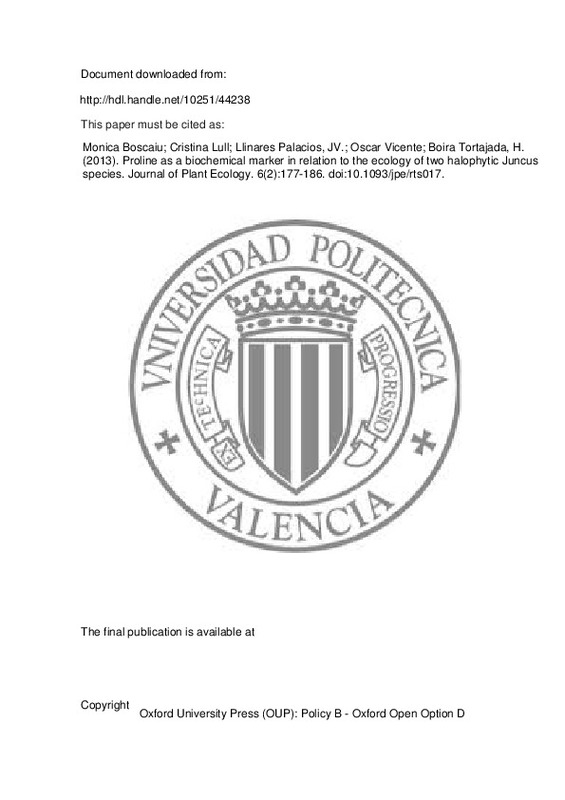JavaScript is disabled for your browser. Some features of this site may not work without it.
Buscar en RiuNet
Listar
Mi cuenta
Estadísticas
Ayuda RiuNet
Admin. UPV
Proline as a biochemical marker in relation to the ecology of two halophytic Juncus species
Mostrar el registro sencillo del ítem
Ficheros en el ítem
| dc.contributor.author | Boscaiu, Monica
|
es_ES |
| dc.contributor.author | Lull, Cristina
|
es_ES |
| dc.contributor.author | Llinares Palacios, Josep Vicent
|
es_ES |
| dc.contributor.author | Vicente, Oscar
|
es_ES |
| dc.contributor.author | Boira Tortajada, Herminio
|
es_ES |
| dc.date.accessioned | 2014-11-17T07:58:20Z | |
| dc.date.available | 2014-11-17T07:58:20Z | |
| dc.date.issued | 2013 | |
| dc.identifier.issn | 1752-9921 | |
| dc.identifier.uri | http://hdl.handle.net/10251/44238 | |
| dc.description | "This is a pre-copyedited, author-produced PDF of an article accepted for publication in Journal of Plant Ecology following peer review." | es_ES |
| dc.description.abstract | [EN] Aims Osmolytes, used for maintaining osmotic balance and as osmoprotectants , are synthesized in plants as a general, conserved response to abiotic stress, although their contribution to stress-tolerance mechanisms remains unclear. Proline, the most common osmolyte, accumulates in many plant species in parallel with increased external salinity and is considered a reliable biochemical marker of salt stress. We have measured proline levels in two halophytic, closely related Juncus species under laboratory and field conditions to assess the possible relevance of proline biosynthesis for salt tolerance and therefore for the ecology of these two taxa. Methods Proline was quantified in plants treated with increasing NaCl concentrations and in plants sampled in two salt marshes located in the provinces of Valencia and Alicante, respectively, in southeast Spain. Electrical conductivity, pH, Na+ and Cl− concentrations were measured in soil samples collected in parallel with the plant material. Important Findings Treatment with NaCl inhibited growth of J. acutus plants in a concentration-dependent manner, but only under high salt conditions for J. maritimus. Salt treatments led to proline accumulation in both species, especially in the more salt-tolerant J. maritimus. The results, obtained under laboratory conditions, were confirmed in plants sampled in the field. In all the samplings, proline contents were significantly lower in J. acutus than in the more tolerant J. maritimus growing in the same area. No direct correlation between soil salinity and proline levels could be established, but seasonal variations were detected, with increased proline contents under accentuated water deficit conditions. Our results suggest that proline biosynthesis is not only an induced, general response to salt stress but also an important contributing factor in the physiological mechanisms of salt tolerance in Juncus, and that it therefore correlates with the ecology of both species. | es_ES |
| dc.description.sponsorship | Spanish Ministry of Science and Innovation and European Regional Development Fund to O.V. (CGL2008-00438/BOS); Polytechnic University of Valencia to M. B. (PAID-06-09). | en_EN |
| dc.language | Inglés | es_ES |
| dc.publisher | Oxford University Press (OUP): Policy B - Oxford Open Option D | es_ES |
| dc.relation.ispartof | Journal of Plant Ecology | es_ES |
| dc.rights | Reserva de todos los derechos | es_ES |
| dc.subject | Halophytes | es_ES |
| dc.subject | Juncus acutus | es_ES |
| dc.subject | Juncus maritimus | es_ES |
| dc.subject | Osmolytes | es_ES |
| dc.subject | Salt stress | es_ES |
| dc.subject.classification | BOTANICA | es_ES |
| dc.subject.classification | BIOLOGIA VEGETAL | es_ES |
| dc.subject.classification | EDAFOLOGIA Y QUIMICA AGRICOLA | es_ES |
| dc.subject.classification | BIOQUIMICA Y BIOLOGIA MOLECULAR | es_ES |
| dc.title | Proline as a biochemical marker in relation to the ecology of two halophytic Juncus species | es_ES |
| dc.type | Artículo | es_ES |
| dc.identifier.doi | 10.1093/jpe/rts017 | |
| dc.relation.projectID | info:eu-repo/grantAgreement/MICINN//CGL2008-00438/ES/RESPUESTAS DE LAS PLANTAS AL ESTRES ABIOTICO: CORRELACION CON LAS CARACTERISTICAS EDAFICAS DE SUS HABITATS NATURALES/ | es_ES |
| dc.relation.projectID | info:eu-repo/grantAgreement/UPV//PAID-06-09/ | es_ES |
| dc.rights.accessRights | Abierto | es_ES |
| dc.contributor.affiliation | Universitat Politècnica de València. Departamento de Ecosistemas Agroforestales - Departament d'Ecosistemes Agroforestals | es_ES |
| dc.contributor.affiliation | Universitat Politècnica de València. Departamento de Química - Departament de Química | es_ES |
| dc.contributor.affiliation | Universitat Politècnica de València. Departamento de Biotecnología - Departament de Biotecnologia | es_ES |
| dc.description.bibliographicCitation | Boscaiu, M.; Lull, C.; Llinares Palacios, JV.; Vicente, O.; Boira Tortajada, H. (2013). Proline as a biochemical marker in relation to the ecology of two halophytic Juncus species. Journal of Plant Ecology. 6(2):177-186. https://doi.org/10.1093/jpe/rts017 | es_ES |
| dc.description.accrualMethod | S | es_ES |
| dc.description.upvformatpinicio | 177 | es_ES |
| dc.description.upvformatpfin | 186 | es_ES |
| dc.type.version | info:eu-repo/semantics/publishedVersion | es_ES |
| dc.description.volume | 6 | es_ES |
| dc.description.issue | 2 | es_ES |
| dc.relation.senia | 253981 | |
| dc.contributor.funder | Ministerio de Ciencia e Innovación | |
| dc.contributor.funder | Universitat Politècnica de València |







![[Cerrado]](/themes/UPV/images/candado.png)

